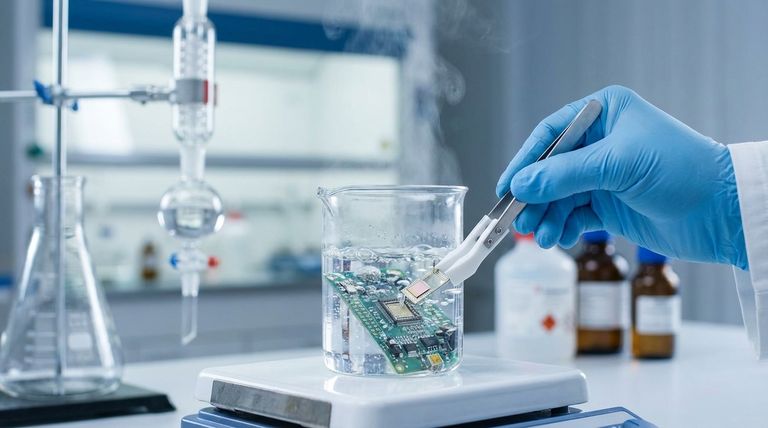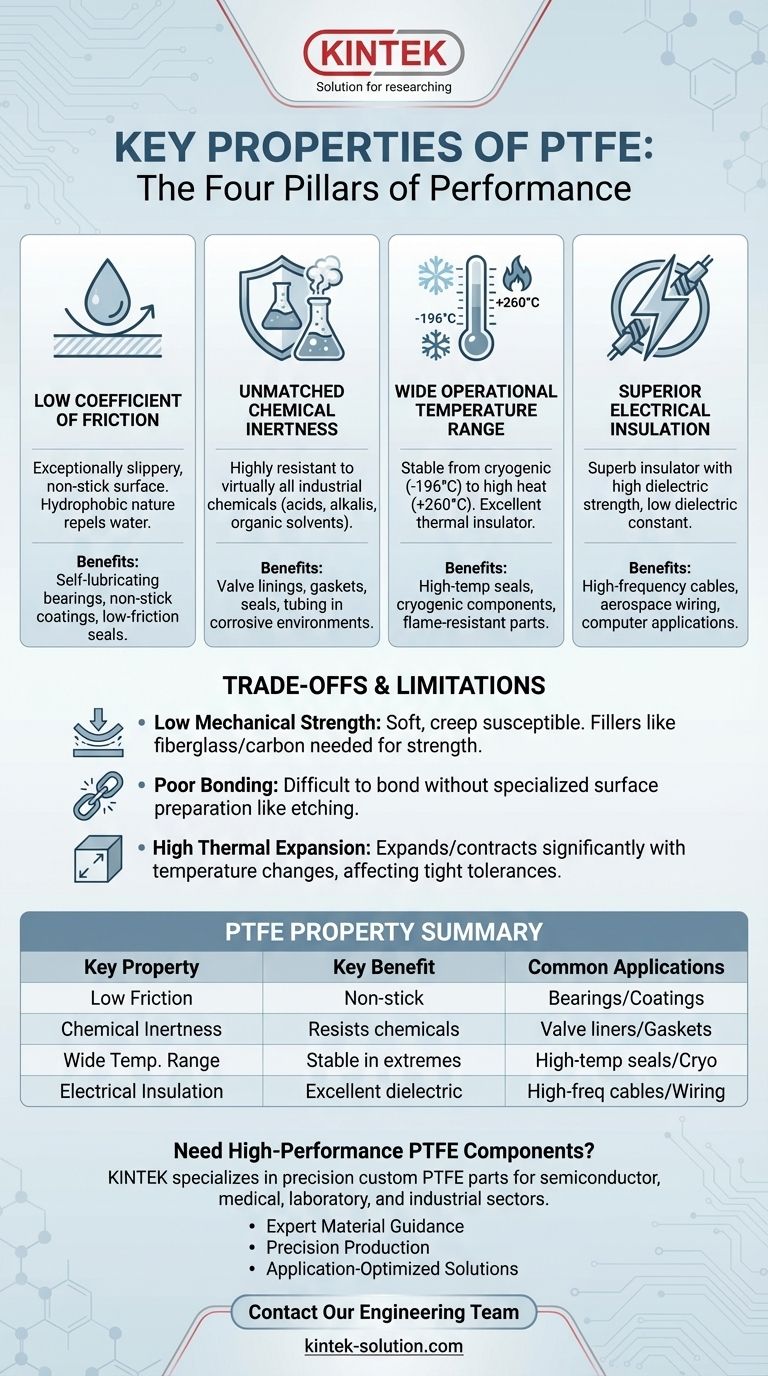Polytetrafluoroethylene (PTFE) is a high-performance fluoropolymer prized for an exceptional combination of key properties. Known commercially as Teflon, its primary characteristics are an extremely low coefficient of friction, near-total chemical inertness, a very wide operational temperature range, and excellent performance as an electrical insulator. These traits make it a unique problem-solver in demanding industrial, chemical, and electrical applications.
PTFE's value lies in its ability to deliver extreme performance across multiple domains simultaneously. However, its signature non-stick nature and relatively low mechanical strength are critical trade-offs that must be managed in any successful design.

The Four Pillars of PTFE Performance
The utility of PTFE stems from four defining characteristics that rarely coexist in a single material. Understanding each one reveals why it is specified for such a wide array of applications.
Exceptionally Low Coefficient of Friction
PTFE has one of the lowest coefficients of friction of any solid material known, often compared to wet ice on wet ice. This creates an incredibly slippery, non-stick surface.
This property is also responsible for its hydrophobic nature, meaning it repels water. This makes it ideal for self-lubricating bearings, non-stick coatings, and low-friction seals.
Unmatched Chemical Inertness
PTFE is highly resistant to virtually all industrial chemicals, including strong acids, alkalis, and aggressive organic solvents. It is considered one of the most non-reactive materials available.
This chemical stability makes it an essential material for components used in corrosive environments, such as valve linings, gaskets, seals, and tubing in chemical processing plants.
Wide Operational Temperature Range
PTFE maintains its properties across an exceptionally broad temperature spectrum. It remains functional and stable from cryogenic temperatures around -196°C (-320°F) up to +260°C (500°F).
Beyond its thermal stability, it is also an excellent thermal insulator and possesses high flame resistance, often carrying a UL94 V-0 rating.
Superior Electrical Insulation
PTFE is a superb electrical insulator with high dielectric strength and high volume resistivity. It effectively prevents the flow of electricity, even at high frequencies.
This makes it a first-choice material for insulating high-performance wires and cables, particularly in aerospace and computer applications where signal integrity is critical.
Understanding the Trade-offs and Limitations
No material is perfect. While PTFE's primary properties are outstanding, they come with inherent limitations that are critical to understand for proper application.
Relatively Low Mechanical Strength
In its pure, unfilled state, PTFE is a relatively soft material. It can be susceptible to creep (deformation under a sustained load) and has poor abrasion resistance compared to other engineering plastics.
To counteract this, fillers like fiberglass, carbon, or graphite are often added. These filled grades of PTFE offer significantly improved strength, stiffness, and wear resistance while retaining most of the base material's key properties.
Poor Bonding and Adhesion
The same non-stick quality that makes PTFE so valuable also makes it extremely difficult to bond to other materials. Standard adhesives will not stick to its surface.
Achieving a strong bond requires specialized surface preparation, such as chemical etching, which alters the surface chemistry of the material to allow for adhesion.
High Thermal Expansion
PTFE has a higher coefficient of thermal expansion than many other engineering materials. This means it will expand and contract more significantly with temperature changes, a factor that must be accounted for in designs requiring tight tolerances.
Making the Right Choice for Your Application
Selecting the correct material requires aligning its properties with your primary engineering goal.
- If your primary focus is low-friction movement: PTFE is an ideal choice for self-lubricating bearings, slide plates, and non-stick surfaces, but consider a filled grade if high wear is a concern.
- If your primary focus is chemical compatibility: Its near-total inertness makes it a default material for gaskets, seals, and linings exposed to aggressive chemicals.
- If your primary focus is electrical insulation: PTFE excels in high-frequency and high-temperature applications where signal integrity and material stability are paramount.
- If your primary focus is structural integrity: Pure PTFE is likely unsuitable; you must specify a filled grade to achieve the necessary mechanical strength and rigidity.
By balancing its exceptional strengths against its practical limitations, you can effectively leverage PTFE to solve some of the most demanding engineering challenges.
Summary Table:
| Key Property | Key Benefit | Common Applications |
|---|---|---|
| Low Coefficient of Friction | Non-stick, self-lubricating | Bearings, seals, non-stick coatings |
| Chemical Inertness | Resists acids, alkalis, solvents | Chemical valve liners, gaskets, tubing |
| Wide Temp. Range (-196°C to +260°C) | Stable in extreme environments | High-temp seals, cryogenic components |
| Superior Electrical Insulation | Excellent dielectric strength | High-frequency cables, aerospace wiring |
Need High-Performance PTFE Components for Your Project?
KINTEK specializes in the precision manufacturing of custom PTFE components—including seals, liners, and labware—for the semiconductor, medical, laboratory, and industrial sectors. We understand how to leverage PTFE's unique properties while expertly managing its limitations through material selection and custom fabrication.
We provide:
- Expert Material Guidance: Help you choose between pure or filled PTFE grades to optimize for strength, wear resistance, or chemical purity.
- Precision Production: Manufacture components to your exact specifications, from prototypes to high-volume orders.
- Application-Optimized Solutions: Ensure your PTFE parts perform reliably in even the most demanding environments.
Let's discuss how our PTFE expertise can solve your specific challenge. Contact our engineering team today for a consultation.
Visual Guide

Related Products
- Custom PTFE Parts Manufacturer for Teflon Parts and PTFE Tweezers
- Custom PTFE Parts Manufacturer for Teflon Containers and Components
- Customizable PTFE Rods for Advanced Industrial Applications
- Custom PTFE Teflon Balls for Advanced Industrial Applications
- Custom PTFE Square Trays for Industrial and Laboratory Use
People Also Ask
- What fabrication services are available for PTFE? Shearing, Stamping, Laser Cutting, Molding & Machining
- What industrial benefits do PTFE-machined parts offer? Achieve Peak Performance in Demanding Applications
- What challenges arise when machining PTFE (Teflon)? Overcome Softness, Heat, and Instability
- What design considerations are important for custom PTFE parts? Design for Performance & Reliability
- What chemical processing applications involve PTFE-machined parts? Essential Components for Corrosive & High-Purity Systems



















